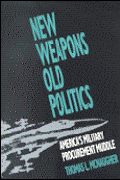Americans spend more than $100 billion a year to buy weapons, but no one likes the process that brings these weapons into existence. The problem, McNaugher shows, is that the technical needs of engineers and military planners clash sharply with the political demands of Congress. McNaugher examines weapons procurement since World War II and shows how repeated efforts to improve weapons acquisition have instead increased the harmful intrusion of political pressures into that technical development and procurement process.
Today’s weapons are more complicated than their predecessors. So are the nation’s military forces. The design of new systems and their integration into the force structure demand more care, time, and flexibility. Yet time and flexibility are precisely what political pressures remove from the acquisitions process.
In a series of case studies and conceptual discussions, McNaugher tackles concerns at the heart of the debate about acquisition—the slow and heavily bureaucratic approach to development, the preference for ultimate weapons over well-organized and trained forces, and the counterproductive incentives facing the nation’s defense firms. He calls for changes that run against the current fashion—less centralization or procurement, less haste in developing new weapons, and greater use of competition as a means of removing the development process from political oversight.
Above all, McNaugher shows how the United States tries to buy research and development on the cheap, and how costly this has been. The nation can improve its acquisition process, he concludes, only when it recognizes the need to pay for the full exploration of new technology.
Author

